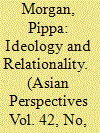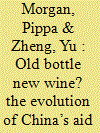| Srl | Item |
| 1 |
ID:
159165


|
|
|
|
|
| Summary/Abstract |
Conventional studies of Chinese aid to Africa typically neglect China's six decades of donor experience, and de-emphasize the distinct historical relationships that China holds with African countries and the ideological and geopolitical contexts in which these relations were built. Applying the framework of relationality that highlights the role of social relationships in defining rational actions, I provide an alternative perspective on Chinese aid by analyzing the ideological and Cold War dynamics that shaped China's early Mao era aid allocation and the impact of these initial ties on contemporary Chinese policymakers' choices about where to direct Chinese aid.
|
|
|
|
|
|
|
|
|
|
|
|
|
|
|
|
| 2 |
ID:
167058


|
|
|
|
|
| Summary/Abstract |
China’s aid is frequently portrayed as a challenger to established Overseas Development Assistance (ODA) norms, but it is unclear when the distinct ‘Chinese-model’ of aid emerged and how it has evolved over time. Using new historical data on Chinese aid in Africa and the case of Ethiopia, we have three main findings. First, China developed a distinct model of mixing ODA-like aid and commercial forms of economic engagement only after the mid-1990s, reflecting institutional reforms for allocating and managing foreign official finance. Second, social sectors have played a much greater role in China’s aid programme than is commonly perceived. Finally, Chinese aid to productive sectors has changed substantially whereas in social sectors it is relatively consistent.
|
|
|
|
|
|
|
|
|
|
|
|
|
|
|
|
| 3 |
ID:
168547


|
|
|
|
|
| Summary/Abstract |
In this article we depart from the classic model of foreign direct investment (FDI) determinants and examine the effect of sociohistorical factors on FDI. We argue that past foreign aid projects confer social capital that constitutes specific resources available to investors in the present, increasing their preferences for host countries in which their home country has accumulated more social capital. We use new data on China's historical aid in Africa to test these contentions, uncovering a positive, significant connection between China's historical aid program in Africa (1956–1999) and contemporary (2000–2015) investments by Chinese companies. While China's historical aid may have been politically driven, it has had important long-term consequences for its commercial investors. More broadly, these findings suggest a sociohistorical explanation of the puzzle of why Chinese foreign investments deviate from conventional FDI patterns.
|
|
|
|
|
|
|
|
|
|
|
|
|
|
|
|
| 4 |
ID:
181134


|
|
|
|
|
| Summary/Abstract |
The nexus between China's human and economic presence abroad and its security policy is increasingly important. Within this nexus, this study statistically explores whether and to what extent Chinese contractors reduce the number of Chinese nationals they send to work in North Africa, the Middle East and the Horn of Africa when the security situation in host states worsens. We find no significant evidence that either warnings from Chinese embassies and consulates to leave host countries or expert perceptions of host stability influence the number of Chinese workers. Worker numbers appear to decrease significantly only in the aftermath of large-scale violent events. These findings suggest that Chinese companies are relatively acceptant of security risks and uncertainties, despite the decade-long regulatory efforts of the Chinese government to make them more security-conscious overseas and, thus, to reduce pressure to use diplomatically and economically expensive military means for their protection.
|
|
|
|
|
|
|
|
|
|
|
|
|
|
|
|